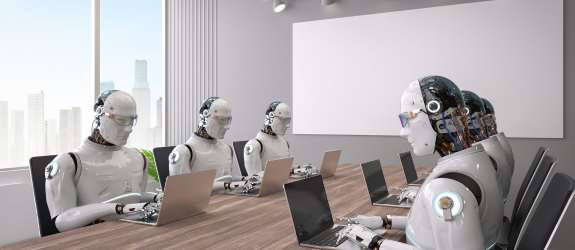What is Artificial Intelligence (AI)?
Right now, artificial intelligence, or AI, is one of the most popular terms in technology, and for good reason. A number of technological breakthroughs and innovations that were previously limited to science fiction have begun to come true in the last few years. If you want a definition of what AI is, then here it is. It is the simulation of human intelligence in machines that are programmed to think and act intelligently like humans.
AI is created by studying brain patterns and analysing cognitive abilities like learning, reasoning, problem-solving, perception, and language comprehension. It will, therefore, result in the development of intelligent software and systems. This article will give you an overview of AI, types, pros and cons, etc. Let’s get into it.
What Are the Different Types?
Artificial intelligence can be classified into several types. There are primarily two categories: those that are based on AI functionality and those that are based on capabilities. The various types are listed below:
Based on Capabilities
- Weak or Narrow AI
- Strong or General AI
1. Weak or Narrow AI
Artificial intelligence systems that are limited to performing particular tasks are referred to as weak AI systems. Although they are not generally intelligent, these systems are excellent at their assigned tasks. Image recognition software, recommendation algorithms, and voice assistants like Alexa or Siri are a few examples. It is limited to working within predetermined parameters and cannot generalise outside of its specialised field.
2. Strong or General AI
Systems that are as intelligent as humans or even more intelligent than humans are called strong artificial intelligence. It would be able to think, reason, learn, and apply information to solve complicated problems in a way that is comparable to human cognition. Strong AI development, however, is still primarily theoretical and has not been accomplished yet.
Based on Functionality
- Purely Reactive
- Limited Memory
- Theory of Mind
- Self-Aware
1. Purely Reactive
Purely reactive AI systems or machines will have no memory or data to work with. They are task-specific, which means they are specialised in just one field of work. Furthermore, they are unable to store memories or past encounters for use in the future. It will only pay attention to present situations and respond to them in the most effective way possible. Deep Blue, the IBM chess program, and Google’s AlphaGo are examples of reactive machines.
2. Limited Memory
In contrast to purely reactive machines, limited-memory machines can continuously add new information to their memory and store it for a brief while. Although their memory is minimal, and they can use the stored data for a limited time period, they have sufficient experience or memory to make wise decisions.
- Self-driving cars are a prime example of limited memory systems.
- The speed limit, the distance between other vehicles, the recent speed of adjacent vehicles, and other data necessary for safe driving can all be stored in these vehicles.
- Another example is that the machine can recommend a restaurant based on the location data it has collected.
3. Theory of Mind
Actually, the term “theory of mind” comes from psychology. But when it comes to AI, theory of mind means the kind of system that has the social intelligence to understand human thoughts and emotions and can interact socially. This kind of AI will be able to anticipate behaviour and deduce human intentions, which is a necessary ability for such systems to become essential components of human teams. However, it is still not developed, but researchers are making lots of efforts and improvements to build it.
4. Self-Aware
These emerging AI technologies will eventually lead to self-aware machines. Such systems have a sense of self, which means they will be intelligent, have sentiments and be conscious. They will be able to understand the state they are in. There is not any AI like this yet and it is still a hypothetical concept.
Advantages of AI
Like all concepts or innovations, artificial intelligence has advantages and disadvantages. Below is an overview of the advantages.
- The ability of artificial intelligence to decrease errors significantly and improve accuracy and precision is one of its most significant advantages.
- By delegating tasks to AI robots, humans can mitigate numerous risks and reap the benefits of artificial intelligence. Additionally, they are resilient and able to perform accurate work with more responsibility.
- It is available 24×7 and can easily do tedious, repetitive jobs with the help of AI algorithms.
- It can be used for digital assistance to engage with users, eliminating the need for human personnel. Specific chatbots are designed in a way that makes it challenging to distinguish between a human and a chatbot during a conversation.
- AI is the engine powering a number of breakthroughs that will help people solve the most challenging problems.
- Its approach is efficient and rational, free of emotions. It also lacks biassed viewpoints, which guarantees more accurate decision-making.
Disadvantages of AI
Here are some of the disadvantages Artificial Intelligence has that you should be aware of.
- It is pretty costly to create a machine that can stimulate human intelligence, as it requires plenty of time, resources and a considerable amount of money. It is also reasonably expensive because it requires the newest hardware and software to stay current and meet requirements.
- One of the significant disadvantages is that it cannot think outside the box, which means it lacks creativity. It can only be learned over time with pre-fed data and past experiences.
- It can result in unemployment as a result of chatbots and robots replacing humans.
- People will grow lazy and tend to use their brains less and less as a result of AI applications automating the most tedious and repetitive tasks.
You can see that artificial intelligence (AI) has a great deal of potential to improve the world now that you have read this article explaining what AI is and its benefits and drawbacks. Although it is undeniable that AI has its pros and cons, the impact of it on the global industry cannot be overlooked. Furthermore, it will undoubtedly continue to develop and grow every day, promoting corporate sustainability.
Interesting Links:

Hi, my name is Rahil. I work at YUHIRO Global and I help web agencies and software companies from Europe to build developer teams in India.


